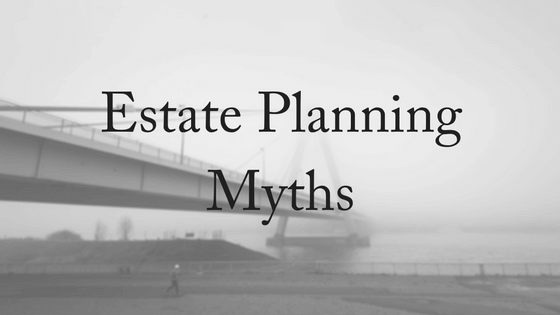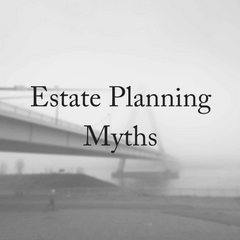
Estate planning myths are common. Myths are often collectively held beliefs that have no basis in fact. Estate planning, like many other areas if life, has it’s own collection of myths. Many popular estate planning myths are loosely based on the truth which is often why they remain in circulation. Let’s make clear what is truth and what is fiction with estate planning.
Estate Planning Myths: #1 If you don’t have a will, your family can just divide your estate up for you.
If you die without a will in Queensland you are said to have died ‘intestate’. Each Australian state has its own rules regarding intestacy. Intestacy rules are put in place to determine who will get your estate if you die intestate. Your family cannot decide for you – your estate will be divided up according to those rules.
Your estate generally will go to your ‘next-of-kin’, which would be your spouse, de-facto or children and grandchildren. Your in-laws or step-parents are not considered next-of-kin. This arrangement allows no flexibility nor does it take into account personal circumstances. It also means that there will be no directions when it comes to how you’d like minor children to be cared for or your wishes regarding funeral arrangements.
To have your estate distributed to the people you’d like it to go to, to make sure your children are cared for, and to update your funeral arrangements, you need to have a valid and up-to-date will.
Estate Planning Myths: # 2 If I have a valid and up-to-date will then it can’t be challenged.
In Queensland, someone has grounds for challenging a will if:
- They have been left out of a will or are receiving less that they believe is fair
- Assets have disappeared from the estate
- The will doesn’t make sense or is unclear
- They suspect the will maker has been unduly influenced
- They believe the will maker has lost mental capacity to make a will
Only certain people have the right under the law to challenge a will. In Queensland, the following people can challenge a will:
- a spouse of the deceased
- a de facto partner
- a child, or grandchild of the deceased
- a dependent in limited circumstances
It is best to prepare a will with the guidance and experience of a professional because this area of the law is complex.
 Estate Planning Myths: #3 I don’t have a big enough estate to need estate planning.
Estate Planning Myths: #3 I don’t have a big enough estate to need estate planning.
This is one of the most common estate planning myths. You don’t have to be rich to have an estate plan. You should have one, because then even the little you do have will be distributed according to your wishes. It might be smaller items of sentimental value, your digital assets and your $1000 bomb of a car that your estate holds, but they are yours to distribute. Although your estate may not be valuable in a monetary way, you have the opportunity to use your estate to show the value of your relationships. It’s also common for people to assume they don’t own much, but overlook their super. Although superannuation can’t be dealt with by a will, it’s often a significant asset and needs to be considered as part of a thoughtful estate plan.
[Tweet “Disinheriting someone from your will is not looked upon favourably by the court.”]
Estate Planning Myths: #4 I can disinherit anyone I want during the estate planning process.
The court actually doesn’t view this move very favourably. The law imposes a moral obligation upon willmakers to adequately provide for immediate members of their families. You need to be very careful how you do this if you choose to do so. It’s actually much better to leave the person you’re not wanting to leave much to at least a small portion of the estate – enough for them to not challenge your will. Including a letter of wishes which outlines why you’ve chosen to do certain things in your will can help to support your wishes being carried out. You also need to ensure that you make ‘adequate provision’ for family members.
Family provision claims arise where a will maker doesn’t make adequate provision in his or her will for family members. In each of the states of Australia, the law casts an obligation upon a will maker to make adequate provision for certain persons. The definition of ‘certain persons’ differs from state to state. In Queensland, a will maker ought to make adequate provision for the following persons:
- Spouse;
- Former spouse (in limited circumstances);
- Child;
- Step-child;
- A dependent (in limited circumstances).
Estate Planning Myths: #5 An estate plan is just about a will.
Estate planning is not just about assets and property. Good estate planning thinks about ‘what if?’ An estate plan gives you the opportunity to choose who will look after your children if you die. It  also allows you to nominate someone to act on your behalf if you become incapacitated in any way – you can choose an enduring power of attorney.
also allows you to nominate someone to act on your behalf if you become incapacitated in any way – you can choose an enduring power of attorney.
Estate planning also can include an advance health directive (sometimes called a living will). This is a document that outlines what medical treatment you clearly do and don’t want. If you lose capacity, this document communicates for you at a time when you can’t.
You may also consider establishing a testamentary discretionary trust to give you further flexibility, particularly if you have a blended family.
Estate Planning Myths: #6: Your debt dies with you.
[Tweet “Your debt does not die when you do.”]
Debt lives on. If you have money owing when you die, then your executor will need to pay what you owe with the cash from your estate. If there is not enough cash, then assets will be sold and the money made from the sale of those will be used to pay for any debts outstanding. It is true that your family will not be chased for your debt, unless the debts were held jointly or it was secured against a particular asset owned by them.
Estate planning is a complex are of the law and to make sure everything is covered, you need to speak to a specialist. For all your estate planning needs, please contact us today. We offer a free, 10-minute phone consultation with one of our experienced estate lawyers.

